Rwanda
- Hôtel des Mille Collines, Kigali
- Chez Lando, Kigali
This is a list of what are intended to be the notable top hotels by country, five or four star hotels, notable skyscraper landmarks or historic hotels which are covered in multiple reliable publications. It should not be a directory of every hotel in every country:
In the United States criminal law, a frame-up (frameup) or setup is the act of falsely implicating (framing) someone in a crime by providing fabricated evidence or testimony. In British usage, to frame, or stitch up, is to maliciously or dishonestly incriminate someone or set them up, in the sense trap or ensnare.

Shake Hands with the Devil: The Failure of Humanity in Rwanda is a book by Lieutenant-General Roméo Dallaire of the Canadian Forces, with help from Major Brent Beardsley. It was first published by Random House Canada in September 2003.
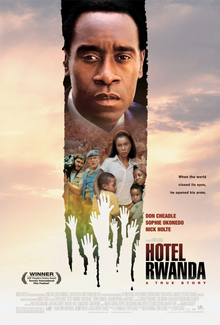
Hotel Rwanda is a 2004 docudrama film co-written and directed by Terry George. It was adapted from a screenplay by George and Keir Pearson, and stars Don Cheadle and Sophie Okonedo as hotelier Paul Rusesabagina and his wife Tatiana. Based on the Rwandan genocide, which occurred during the spring of 1994, the film documents Rusesabagina's efforts to save the lives of his family and more than 1,000 other refugees by providing them with shelter in the besieged Hôtel des Mille Collines. Hotel Rwanda explores genocide, political corruption, and the repercussions of violence.
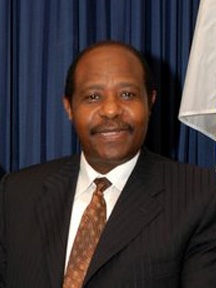
Paul Rusesabagina is a Rwandan human rights activist. He worked as the manager of the Hôtel des Mille Collines in Kigali, during a period in which it housed 1,268 Hutu and Tutsi refugees fleeing the Interahamwe militia during the Rwandan genocide. None of these refugees were hurt or killed during the attacks.

The Hôtel des Mille Collines is a large hotel in Kigali, Rwanda. It became famous after 1,268 people took refuge inside the building during the Rwandan genocide of 1994. The story of the hotel and its manager at that time, Paul Rusesabagina, was later used as the basis of Terry George's film Hotel Rwanda in 2004.
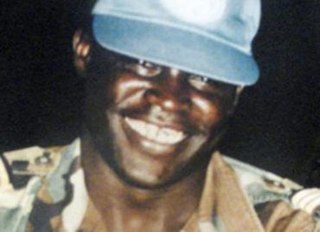
Mbaye Diagne was a Senegalese military officer who served in Rwanda as a United Nations military observer from 1993 to 1994. During the Rwandan genocide he undertook many missions on his own initiative to save the lives of civilians.
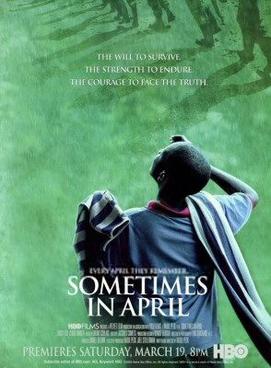
Sometimes in April is a 2005 American made-for-television historical drama film about the 1994 Rwandan Genocide, written and directed by the Haitian filmmaker Raoul Peck. The ensemble cast includes Idris Elba, Oris Erhuero, Carole Karemera, and Debra Winger.
Georges Henri Yvon Joseph Ruggiu is a Belgian radio presenter who worked for Rwandan radio station Radio Télévision Libre des Mille Collines, which played a significant role in promoting the genocide against the Tutsi. Like the station's other broadcasters, Ruggiu incited violence against Tutsi and moderate Hutu over the air. He had become involved in Rwandan politics just two years before the genocide.
Mille Collines, French meaning "thousand hills", may refer to:

The Amahoro Stadium, officially known as Amahoro National Stadium, is a multi-purpose stadium in the Gasabo district of Kigali, Rwanda. With a capacity of 45,000, it is the largest stadium in Rwanda and hosts football matches, concerts, and public events. The football clubs Armée Patriotique Rwandaise F.C. and Rayon Sports F.C. are the tenants. The venue is also sometimes used for rugby union.

A Sunday in Kigali is a 2006 Canadian feature film set during the Rwandan genocide. It is directed by Robert Favreau based on the novel A Sunday at the pool in Kigali by Gil Courtemanche.

The Grand Hotel Bucharest is a 24-story 87 m (285 ft) high-rise five-star hotel situated near University Square, Bucharest, in Sector 1. Opened in 1971 as the Inter-Continental Bucharest, it is a city landmark.
Continental Hotels is the first Romanian hotel chain. The chain includes 12 hotels. Continental Hotels on the Romanian hospitality market started in 1991. From the very start, the target was the business tourism market. The company’s development aimed at covering the luxury, the business and the economy market, by providing 5, 4, 3 and 2 star accommodation services. Continental Hotels provides accommodation services, in 8 Romanian cities: Bucharest, Arad, Constanța, Oradea, Sibiu, Târgu Mureș, Suceava, Drobeta-Turnu Severin and has 1860 hotel rooms in 12 hotels. The Continental Hotels portfolio comprises the following hotel’s brands: Grand Hotel Continental*****, Continental Forum****, Continental***, MyContinental ***, Hello Hotels**; and also some food & beverage brands: Concerto Restaurant, Balkan Bistro, Bistro Continental, MyBistro, Mondo Restaurant, Victoria Club, Cofetăria Continental, Tekaffe.

Georges Anderson Nderubumwe Rutaganda was the second vice-president of the Rwandan Hutu militia Interahamwe. Rutaganda played a crucial role in the Rwandan genocide of 1994. Prosecutor James Stewart stated that "Without Georges Rutaganda, the Rwandan genocide would not have functioned the way it did." He was on radio RTLM in Kigali in 1994, encouraging Interahamwe Militia to exterminate all Tutsis. It was alleged that Rutaganda captured, raped, and tortured Tutsi women in Interahamwe hideouts in Kigali. Other accounts state that Rutaganda captured Tutsi prostitutes, believing them to be witches.

Stefan Steć was a major of the Polish Armed Forces. In 1994, he served as a peacekeeper in the UNAMIR forces in Rwanda under general Roméo Dallaire. For his dedication in saving lives during Rwandan genocide at the risk to his own, he was awarded the Cross of Merit for Bravery by Polish President Lech Wałęsa. He died at the age of 40 due to complications from posttraumatic stress disorder.
These are some of the articles related to Rwanda on the English Wikipedia pages:

Jerry Robert Kajuga was national president of the Interahamwe, the group largely responsible for perpetrating the Rwandan genocide against the Tutsi people in 1994. Born to a Tutsi father and a Hutu mother, Kajuga concealed his background and presented himself as being of pure Hutu descent. This is notable as Hutu Power extremist groups considered Hutus who married Tutsis to be race traitors, and Kajuga went to great lengths to conceal his identity.

Tatiana Rusesabagina is a Rwandan who with her husband Paul Rusesabagina, survived in Hôtel des Mille Collines during the 1994 Rwandan genocide, and saved over a thousand people from being murdered. This story was used as the basis for the 2004 film Hotel Rwanda, in which Tatiana was portrayed by Sophie Okonedo, who was nominated for an Academy Award for Best Supporting Actress for her performance as Tatiana.
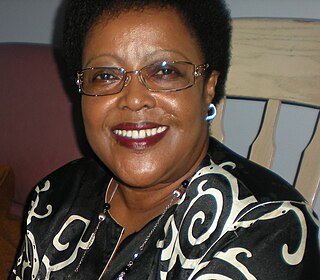
Hon. Dr. Monique Mujawamariya is a Rwandan human rights activist who moved to Canada and then South Africa. She was a survivor of the Rwandan genocide and she won an international award in 1995. In 2014 she was living in South Africa where she is concerned with women's rights.
The following is a timeline of the history of the city of Kigali, Rwanda.